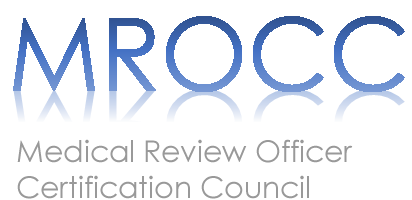Promoting and Preserving
the Highest Quality of
Standards Among MROs
and Their Teams.

MROCC
Medical Review Officer Certification Council
Physician Focused and Physician Governed
The Medical Review Officer Certification Council (MROCC) is a non-profit corporation offering Medical Review Officer certification to physicians (M.D., D.O. or equivalent) who have had appropriate and specific training in the duties and the responsibilities of the professional Medical Review Officers (MROs). In addition, for well-qualified non-physician Team Members, MROCC offers certification to validate their many and varied administrative duties associated with the drug testing evaluation process.
Mission Statement
MROCC promotes and preserves the highest quality of standards among MROs and their Team Members by setting standards, defining MRO competencies, promoting a Code of Ethics, offering certification examinations and providing publications and educational activities.
The Need for Certification
Quality assurance in drug testing is of prime concern when drug tests are used for making employment related decisions. More than 60 percent of large private employers require drug and alcohol testing, and over 20 million forensic drug test specimens are processed by certified laboratories every year. The results of these laboratory tests are reviewed and interpreted by thousands of highly-qualified physicians acting as MROCC certified MROs.
The ramifications of workplace drug testing can be serious to both the employer and the employee. Employee use of illegal substances is a definite obstacle to the stability and safety of the workplace. However, proper evaluation of test results in conjunction with the medical history (while protecting the employee's privacy) is essential to avoid falsely accusing an employee of illicit drug use.
MROCC credentials highly qualified physicians as MROs. The examination used to determine certification is based on the Department of Transportation's Federal Regulation 49 CFR Part 40 and the MRO Competencies document developed by the MROCC Board.
- The certified MRO is a licensed physician who is qualified to evaluate laboratory drug test results within federally mandated/non-mandated workplace drug testing programs.
- As a "gatekeeper", the MRO protects the donor from a false accusation of illicit drug use when there is an alternate medical explanation for the laboratory result.
- At the same time, the certified MRO protects the company by helping with policies and regulatory issues, as well as providing related services, such as drug test collections, breath alcohol testing services, coordination of laboratory services, laboratory performance testing, and preparation of summary reports for employers.
- All MROCC certified MROs are expected to follow a code of ethics.
Learn more about the role of the MRO from the Department of Transportation website.
FOUNDING ORGANIZATIONS
By the beginning of 1992, a need for the certification of MROs for drug testing programs became widely recognized. The American College of Occupational and Environmental Medicine (ACOEM) responded to this need by establishing MROCC. It had been the belief of ACOEM leadership that the certification of physicians as MROs, like the certification of physicians in any other area of medicine, could only be meaningfully established by physicians and under the auspices of an AMA recognized medical specialty organization or board. The additional sponsorship by other leading medical societies further enhanced the credibility of this certification program and the credentials provided to examinees. MROCC's Physician Board was founded in 1992 with representation from a variety of medical specialties and associations:
- American Academy of Clinical Toxicology
- American College of Occupational and Environmental Medicine
- American College of Medical Toxicology
- American Medical Association
- American Society of Addiction Medicine
- College of American Pathologists
WHO WE ARE
BOARD MEMBERS
All MROCC Board Members are certified MROs and experts in the drug testing field. Our Board members wear a variety of different hats and span many different specialties including Occupational Medicine, Family Medicine, Addiction Medicine, Internal Medicine, and Pathology.
Benjamin Gerson, MD - Chair
James Ferguson, DO - Vice Chair
Douglas Martin, MD - Secretary/Treasurer
Neha Badheka, MD
Kenneth Lankin, MD, MBA, MPH
Gina Pervall, MD
Kent Peterson, MD
Melissa Snider-Adler, MD
Stephen Taylor, MD, MPH
EXAM DEVELOPMENT COMMITTEE
The MROCC Examination Development Committee is appointed by the Board of Directors and is made up of recognized leaders in workplace drug and alcohol testing selected from the fields of substance abuse, occupational medicine, toxicology, and the legal profession.
Mark Upfal, MD, MPH - Chairman
Carl Christensen, MD, PhD
Anthony Costantino, PhD
Donna Smith, PhD
Jim L. Swart, MS
Robert Swotinsky, MD, MPH
MROCC OFFICE/STAFF
MROCC
3231 S Halsted St
Ste Front #167
Chicago, Illinois 60608
(T) 847-631-0599 | (F) 847-483-1282
General email: mrocc@mrocc.org
Kristine Pasciak, Executive Director: Kris@mrocc.org
Katy Gainer, Program Manager: Katy@mrocc.org



